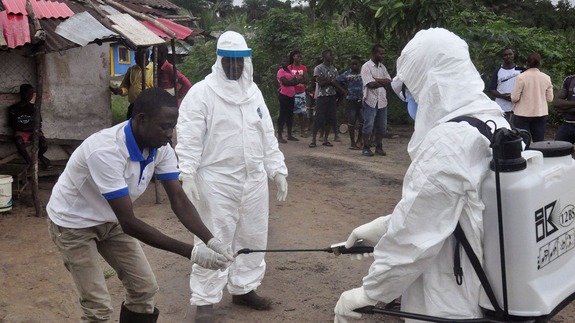The World Health Organization on Wednesday hailed the fewest weekly infections for over a year in the west African Ebola epidemic, but warned they were braced for a significant new outbreak in Sierra Leone.
There were just four confirmed cases in Guinea in the week to Sunday and three in Sierra Leone, the WHO said in the latest of its weekly updates on the epidemic.
But it warned that one of the Sierra Leone cases, a patient who died after traveling from the capital Freetown to the central district of Tonkolili, posed “a substantial risk of further transmission.
“On July 19 the case attended a community hospital complaining of a headache, and was treated as an outpatient and discharged,” the WHO said.
“Two days later on July 21, the case presented to a different hospital and was isolated on admission. The patient died on July 23 and was confirmed (Ebola) positive after post-mortem testing.
“Over 500 contacts have been listed so far, several of whom are deemed to be high risk. Investigations are ongoing to establish the source of infection and identify and trace all contacts.”
The WHO said all of the 500-plus contacts are in Tonkolili, which reported its first new case of Ebola earlier this month, ending a 150-day run of no new infections.
Around 28,000 people have been infected in the two countries and neighboring Liberia in the worst Ebola outbreak in history, more than 11,000 of them fatally, according to official data widely seen as an underestimate.
Sierra Leone President Ernest Bai Koroma has unveiled a two-year post-Ebola “battle plan” to reinvigorate the private sector as an engine for economic growth and job creation.
The program will be funded by more than $804 million earmarked for Sierra Leone at this month’s U.N. Pledging Conference on Ebola.
There was better news elsewhere, with Liberia reporting no new cases in the week to Sunday, following a small outbreak a month ago that dashed hopes that the country had eradicated the spread of the virus among humans for good.
Six people were confirmed infected in the first cluster of cases for three months. Two of them died, but the remaining four have been given the all clear and the country is once again dealing with no known cases.
For the first time since the epidemic emerged in December 2013, Guinea’s new cases were all registered contacts of previous Ebola patients, a strong indicator that the spread of the virus is under control.
The seven cases in Guinea and Sierra Leone represented the lowest weekly total for over a year, the WHO said, snapping a two-month run during which weekly case incidence had plateaued at between 20 and 30.
FRENCH VERSION
Il y avait seulement quatre cas confirmés en Guinée dans lasemaine au dimanche et trois en Sierra Leone, l’OMS a dit dansle dernier de ses mises à jour hebdomadaires sur l’épidémie.
Mais il a averti que l’un parmi les cas de la Sierra Leone, unpatient décédé après le voyage de la capitale Freetown à lacentral district de Tonkolili, pose “un risque important detransmission plus loin.
« Le 19 juillet le cas ont assisté à un hôpital communautaire ense plaignant de maux de tête, traité en ambulatoire et libéré, » a dit l’OMS.
“Deux jours plus tard, le 21 juillet, l’affaire présentée à un autrehôpital et a été isolé à l’admission. Le patient est décédé le 23juillet et a été confirmé positif (virus Ebola) après autopsie essais.
“Plus de 500 contacts ont été répertoriés à ce jour, plusieursd’entre eux sont réputés à haut risque. Investigations sepoursuivent pour établir la source d’infection et d’identifier et deretracer tous les contacts”.
L’OMS a déclaré que tous les contacts de plus de 500 sont àTonkolili, qui a signalé son premier nouveau cas du virus Ebola,plus tôt ce mois-ci, se terminant une course de 150 joursd’aucune nouvelle infection.
Environ 28 000 personnes ont été contaminées dans les deuxpays et le Libéria voisin dans la pire épidémie d’Ebola dansl’histoire, plus de 11 000 d’entre eux mortellement, selon lesdonnées officielles, jugées largement sous-estimé.
Le Président de la Sierra Leone Ernest Bai Koroma a dévoilé un «plan de bataille » deux ans post-Ebola à revitaliser le secteurprivé en tant que moteur économique croissance et créationd’emplois.
Le programme sera financé par plus de $ 804 millions prévuspour la Sierra Leone à U.N. Conférence ce mois-ci de donateurssur l’Ebola.
Il y avait des nouvelles de mieux ailleurs, avec le Libéria, aucunnouveau cas de déclaration de la semaine au dimanche, aprèsune petite flambée il ya un mois qui se précipita espère que lepays a éradiqué la propagation du virus chez l’homme pour debon.
Six personnes ont été confirmées sont infectées au cours de lapremière grappe de cas pendant trois mois. Deux d’entre euxsont morts, mais les quatre autres ont été donnés le clair du toutet le pays traite une fois de plus pas de cas connus.
Pour la première fois depuis que l’épidémie apparue endécembre 2013, les nouveaux cas de la Guinée étaient toutes descontacts précédents patients Ebola, un bon indicateur que lapropagation du virus est sous contrôle.
Les sept cas en Guinée et en Sierra Leone a représenté le totalhebdomadaire le plus bas pour plus d’un an, l’OMS a déclaré,claquer un deux mois exécuter au cours auquel cashebdomadaire incidence avait atteint un plateau à entre 20 et 30.


